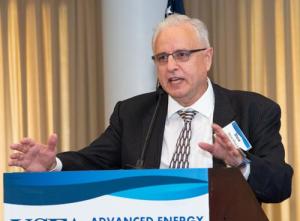When Grid Transformation Becomes a National Imperative
Steve Mitnick is President of Lines Up, Inc., Editor-in-Chief of Public Utilities Fortnightly, author of “Lines Down: How We Pay, Use, Value Grid Electricity Amid the Storm,” formerly an expert witness that testified before utility regulatory commissions of six states, the District of Columbia, the Federal Energy Regulatory Commission, and in Canada, and a faculty member at Georgetown University teaching undergraduate microeconomics, macroeconomics and statistics. He’s not sure he’ll still be PUF’s chief editor when the time of big things comes but he hopes so.
Virtually all of us know this. To even come close to attaining the climate change policy goals we oftentimes hear from political leaders, the media and the public, the nation must make historic investments in the grid's transmission and energy storage.

The nation must, if it is to come close to these goals, summon the will and reach deep into its pocketbook. To accelerate research in these technologies. To fast-track through the obstacles to construct infrastructure of all kinds that have festered.
And to build like the dickens. At a pace and scale reminiscent of the heroic Niagara Project highlighted in this issue of Public Utilities Fortnightly. At the pace and scale of when the country installed the interstate highway system and of when the space program landed an astronaut on the moon for the first time.
Actually, the task is taller than that. The nation must simultaneously make unprecedented investments in the grid's resilience. As cyber, natural and physical threats grow alarmingly. As our society's dependence on uninterrupted electricity grows.
A side note. Consider this. When we've electrified transportation in a couple of decades - more or less - what happens if there's a week-long interruption to the supply of electricity? Or longer? Not good.
When we step away from our industry gatherings, regulatory hearings, engineering designs, and financial spreadsheets, we also know this. Few of our fellow citizens comprehend the challenges and costs ahead as do we.
It's not for lack of trying on our part. Many of us have made the case more than once for projects to move the nation toward the clean and resilient grid that is so broadly wanted and demanded. Our batting average however is so low it would get us "designated for assignment" if there was such a measure of failure in our line of work as there is in major league baseball.
Our models to thoroughly demonstrate the benefits-to-costs of climate change and resilience projects are necessarily too complex to compel. Our locations - for transmission projects particularly - stir fierce skirmishes with nearby folks who see no tangible benefit from intrusions into their status quos. Our approval processes require projects to jump through multiple hoops which practically invites competing economic interests to take clear and deadly shots.
And so, as PUF's chief editor, I constantly find frustration when looking around for hope that investments needed to combat climate change and to improve resilience will make it from the conceptualization stage all the way to construction and completion. It's enough to drive this industry veteran to drink. Which I do not. Not as of yet.
Though, not surprisingly, I am hopeful. And this is why.
One of the distinctive characteristics of Americans is that when we do finally summon the will to do big things we really do marshal enormous resources to get them done. History proves the point time and again.
I don't pretend to project how the political winds will blow. But it seems like a safe bet that making the grid cleaner and more resilient will eventually become a high political priority. And when that happens, political leaders won't stand for the roadblocks of yore.
Like blocking a major project with outsized impact on renewable power development just because a few property owners are opposed, or because a competing company wants to slow it down, or because its costs would raise residential rates by a dollar per month or two.
When President Dwight Eisenhower got the interstate highway system jump-started, he persuaded people that it was a military imperative, to hasten the transportation of forces and equipment in times of a national defense emergency. When his successor, President John Kennedy, got the space program jump-started, he persuaded people that it was a test of our character, to prove that our way of life would prevail over communism.
Perhaps, just perhaps, when a future President gets the grid transformation jump-started, she shall persuade people that it is a matter of survival. After that stirring speech in the Halls of Congress, I suppose those frustrating barriers to needed projects will fall one by one. In that time, people won't put up with the folks who oppose on the basis of their narrow self-interests. In that time, if only for a few sweet years, the country will be united in doing big things again.


